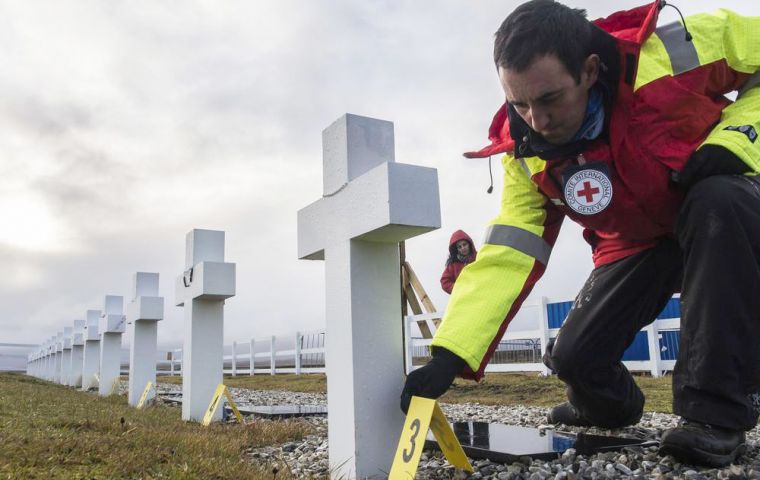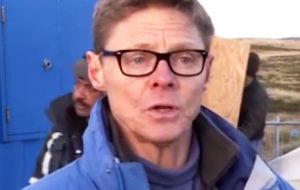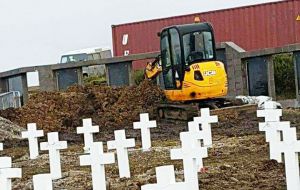MercoPress. South Atlantic News Agency
Falklands' Argentine cemetery clandestine photos: Red Cross has all the facts and identity of the alleged individual
 Member of the ICRC team at the Argentine cemetery (Pic: ICRC)
Member of the ICRC team at the Argentine cemetery (Pic: ICRC)  Project co-ordinator Morris Tidball-Binz said ICRC had established the origin of the pictures but preferred not to name the individual: it is part of an investigation.
Project co-ordinator Morris Tidball-Binz said ICRC had established the origin of the pictures but preferred not to name the individual: it is part of an investigation.  In mid-July photographs of the inside of the cemetery, taken while work was ongoing, were published on a heavily followed Facebook page
In mid-July photographs of the inside of the cemetery, taken while work was ongoing, were published on a heavily followed Facebook page ”Everything was caught on camera and there is an ongoing investigation,” the International Red Cross has confirmed, referring to the controversy in July when images of the Argentine cemetery in the Falkland Islands were reproduced in the Argentine press.
The pictures were published despite security measures in place to protect the sensitive project to exhume, analyse, document and rebury the remains of Argentine soldiers ‘known only to God’. The project is now complete after seven weeks work and in the coming weeks the cemetery will be restored to its original state.
The work began on June 20 with a team of 14 specialists from Argentina, Australia, Chile, Mexico, Spain and the UK and was carried out in a high-tech temporary mortuary built on-site for the purposes of the operation.
However, in mid-July photographs of the inside of the cemetery, taken while work was ongoing, were published on a heavily followed Facebook page belonging to an ex-Argentine Army/Navy NCO Dante Cantone. He said he had received the photographs from the Falklands.
Speaking to Penguin News this week, the forensic project co-ordinator, Morris Tidball-Binz said they had established the pictures were taken from an angle external to the perimeter of the cemetery and the incident was caught on camera. He said the taking of the photographs was, “inappropriate and surreptitious.”
He preferred not to name the individual saying it was part of an investigation.
Mr. Tidball-Binz acknowledged that some people including British and Argentine veterans and families of the war dead and some locally based persons had been allowed to visit the cemetery, but they had always been clearly briefed in relation to security.
In July Maria Fernanda Araujo, president of the Malvinas Fallen Families organisation, said the whole situation was of great concern to the organisation and efforts were focused on trying to determine ICRC responsibility for not having controlled that such pictures were taken at the cemetery.
She stated: “This is how far we reached; they will have to explain what happened in Court.”
Tidball-Binz stated in a recent ICRC press release: “We have striven to work to the highest scientific and technical standards, despite the logistical challenges involved. The team’s wealth of experience in this kind of operation and the strength of their humanitarian commitment was what made it possible.”
He said the remains had been treated with the greatest respect. “We hope, through our efforts to give the dead back their identities and thereby bring answers to their families, who have spent more than three decades waiting for their loved ones’ remains to be identified.”
The second and final batch of samples for genetic analysis will be delivered shortly to the laboratory of the Argentine Forensic Anthropology Team (Equipo Argentino de Antropología Forense, EAAF) in Córdoba. The samples taken from the families for cross-referencing purposes are also held there.
Two other laboratories, one in the United Kingdom and one in Spain, will carry out quality control on the DNA analyses. The identification reports will be finalised by the end of the year and submitted to both governments.
In Argentina authorities will contact the families who have requested the identification directly and confidentially to inform them of the results.
In December 2016, the governments of Argentina and the United Kingdom, and with the consent from the Falklands, agreed to do their utmost to identify the remains of the soldiers killed in the 1982 War, in accordance with their obligation under international humanitarian law to identify those killed on the battlefield.
That agreement resulted in the Humanitarian Project Plan, which entrusted the ICRC with the task of identifying the soldiers’ remains. A spokesperson said: “The ICRC carried out this work in accordance with its humanitarian mandate. It is thereby meeting the needs and interests of the families and helping the parties fulfil their obligations, drawing on its vast experience in conflict-related forensic work” (Penguin News).




Top Comments
Disclaimer & comment rules-

-

-

Read all commentsThink
Aug 11th, 2017 - 08:24 pm +6You could always move ALL the graves back to ARGENTINA where they belong and all your problems would be solved. Just think, you would have nothing to moan about on this subject.
It would have been an Argentine would bet my last pound..............name and shame them and also how they got out there as they would not have walked.........
Aug 11th, 2017 - 04:45 pm +5THink- the damage at the Arg War Cemetery was 50% likely to have been done to order by your last Govt or its cohorts to make a political issue out of it.
Aug 11th, 2017 - 08:38 pm +5I agree- whoever did it- despicable- but you cannot just blame this way- maybe and maybe not.
How could it have been prevented? - ideas please. 24hr CCTVpaid for by whom?- 24hrs guards there? - paid for by whom?
Apparently your side could not even keep up the payments for basic grounds maintenance- hence it has gone backwards over the last 3 years. Shame.
What we can agree is that the ICRC did a top job- apart from that security bungle- and they will ensure the Cemetery is left in a better state than they found at the start.
Plenty of folks here with a very hard political line towards Argentina- but I have yet to meet just one of them who does not say - “for those buried in their war cemetery- one has to remove the politics and say they died in uniform fighting for their country under orders as servicemen - and are thus due respect and decency.”
Commenting for this story is now closed.
If you have a Facebook account, become a fan and comment on our Facebook Page!